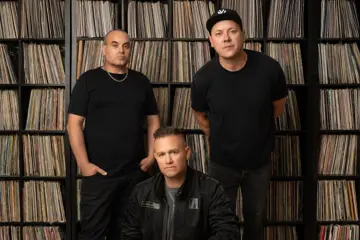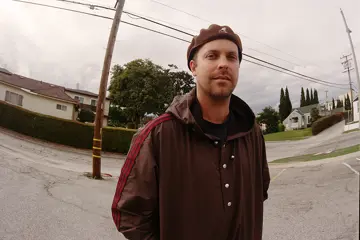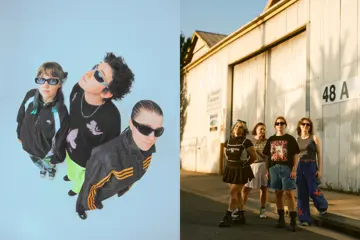The fact that Dunedin indie progenitors The Chills released their fifth album, Silver Bullets, last month — some 19 years after its predecessor, Sunburnt (1996), no less — is quite surprising in and of itself, given the problems faced over recent years by founding member and frontman Martin Phillips. The singer-songwriter had fallen into drug addiction following a crippling bout of depression in the '90s, a downward spiral culminating in him acquiring Hepatitis C, an affliction he fights to stop ravaging his body to this very day.
But even more astounding is the fact that Silver Bullets is up there with the band's most cohesive and compelling works after all these years — no mean feat given the calibre of their back catalogue. From their fledgling days on pioneering indie Flying Nun in the '80s, onto their major label foray in the early '90s which produced the closest thing they've come to a crossover hit, the aptly titled Heavenly Pop Hit from 1990's Submarine Bells through their prodigal return to Flying Nun a few years later, The Chills have always delivered a distinctive brand of lush, shimmering pop, with overlaying guitars, oft-complex arrangements and compassionate, bittersweet lyrics. They always sounded defiantly like The Chills, no matter what else was going on around them.
This resolute stance earned them a cult following all over the world, but the legitimate chart success that they experienced in their native New Zealand didn't translate elsewhere. Their return isn't an effort to rectify that, it's more to consolidate their place in the musical pantheon — something that seems important to the music-loving Phillips. And it's not like The Chills were split up and are reforming — the last 15 years has seen a steady stream of demos collections, boxsets and EPs plus sporadic shows in their home country — but they've certainly been off the radar of popular culture. So to suddenly reappear clutching an album so resoundingly strong as Silver Bullets is — in the circumstances — nothing short of a miracle.
"I'm actually getting a bit overwhelmed by the response, because it's been so uniformly positive," says Phillips. "We in the band knew that it sounded good, but... people have been saying really good things, it's been amazing."
Don't miss a beat with our FREE daily newsletter
You can tell Phillips' bemusement is genuine, not because he doesn't rate the record, but more that he wasn't expecting anyone to care anymore after being off-grid so long. He explains that he still had hopes and ambitions for the album, they just weren't as lofty as back in the day.
"I'm actually getting a bit overwhelmed by the response, because it's been so uniformly positive."
"Only in the sense that I didn't want to make a dud, you know," he chuckles softly. "As a music fan I've been disappointed, as we all have, by people making comeback albums or albums that maybe they were contractually obligated to make. I don't know, but there are a lot of records out there that really didn't need to be released and it can be a shame to see your heroes in particular kinda releasing sub-standard material. So that was the main thing, I didn't want to release anything unless I knew it was worthy of what has become a bit of a legacy. People have really, I guess, put a lot of faith in me and the band and I didn't want to let them down."
"So that was one thing, and the other thing was to make a record that kinda wasn't a complete departure from what we'd done before, but was still a contemporary sound, not in the sense of breaking new ground, but that it was recorded in a contemporary studio so it didn't sound like an '80s record. That was important too, just to make it something that people who have never heard of The Chills could pick up and get into the band that way."
Album track Molten Gold first appeared as a standalone single in 2013, but it's far from the oldest moment on Silver Bullets.
"Some of the basic riffs have been kicking around," Phillips ponders. "The basic guitar part for America Says Hello — I've been working on and off on that for years. There are pages and pages of completely different lyrics with different directions, different titles. And same with Warm Waveform, that was actually released in the late '90s, I think it was, on a collection of my old home recordings from my four-track cassette porta-studio - it was just called Warm at that point, and it was an instrumental with some sort of vocal 'oohs' and 'ahs' on it, so that's been kicking around a bit.
"Basically once we got the go-ahead to do this album the bulk of it was written in about a year, I think it was. I'd say probably 80 percent of the lyrics that I had in mind for any of the tunes just went out the window - they were no longer appropriate, they weren't what I was thinking about these days. That's when I realised that I had to take on some of these issues — the issue songs about America and about the environment and stuff — which was something that I had never actually wanted to do before, because you can make a record date very badly by singing about contemporary problems like that. It just seemed that that's what was going through my mind, and I realised that as a songwriter I should be able to tackle that and see if I can make it not just a bunch of slogans and actually do something worthwhile with it."
The tracks he's referring to, America Says Hello and Underwater Wasteland, certainly succeeded in that regard, but surely older tracks like Come Home and The Male Monster From The Id — or the Greenpeace information in the liner notes to 1990's Submarine Bells — have found Phillips dabbling in societal politics to some degree?
"I'd say probably 80 percent of the lyrics that I had in mind for any of the tunes just went out the window - they were no longer appropriate, they weren't what I was thinking about these days."
"Well yeah I have actually, in fact I'd sort of forgotten how much I had until people started pointing it out!" he concedes. "There has been the odd thing going all the way back in some ways, but this is more of a concerted effort. That was, I guess, another need for the album — it had to have a certain cohesiveness to it and I do think that there's an overall theme to this record that is much stronger than any of the other albums, just in terms of the songs actually being part of a whole. Without putting down any of the older albums, they were more just collections of songs in a lot of ways. This one just seems to have some unity to it, and I know what will happen because it's the kind of thing that I wont be aware of actually what it is until I listen to it in maybe ten years time. That's when I'll get it - it takes me quite a few years to hear what other people are hearing. I'm looking forward to that."
The album's centrepiece is the epic suite Pyramid/When The Poor Can Reach The Moon: two obviously different songs which have been seamlessly melded together into one spine-tingling whole.
"They were both songs where — how should I put it — neither of the two bits wanted to evolve into fully fledged songs on their own," Phillips explains. "They're kinda weird song structures, but that's how they actually formed. Then I realised that they were both different sides of the same coin and that they were both thematically linked, so I just sort of bunged them together. I love doing that kind of stuff, just putting odd things together in music and seeing what happens. I know a lot of people think that the transition from Pyramid into Moon is one of the highlights of the record, so that's really good."
That segue is indicative of the other arrangements on the album — elaborate and ambitious — but Phillips recounts that they weren't particularly time-consuming despite their extravagance.
"It was done pretty quickly," he shrugs. "Coincidentally, Pyramid/Moon was done separately in Thailand the year before — that was done when we recorded [Molten Gold B-side] Pink Frost 13 over in Thailand. It was sort of meant to be a B-side or similar — another track for a possible single — but they all knew that it was going to be an album track and I treated it as a chance to really see how my band would do in the studio because it's a very challenging song. We went in with kind of a bare structure and I really wanted everyone to dig deep and see what happened. I firmly believe that it worked out really well, it sort of showed off everyone's talents and how we worked really fast and really hard together.
"And the rest of the album was done in Dunedin, in a little studio here which was certainly one of the last of the old BBC studios. It's pretty much modelled on Abbey Road Studio 2 and it's an old radio studio, but they've got a completely up-to-date desk — a beautiful desk — in there, so we did the bulk of that last year I think in June or July, somewhere around then. Then when we toured overseas last year through Europe and the UK I stayed on afterwards and mixed the album in London and did all the final overdubs and stuff there. So it's actually been quite a long process."
He must be pretty happy to finally be sharing it then?
"Oh you can't believe the relief, honestly," Phillips sighs. "Because it's been so long, and also there were contractual things that had to be worked out that delayed the release - it was originally meant to be released in February of this year but it kept getting pushed back. And frankly, I've been pretty open about the fact that I have Hepatitis C and my liver's not in good condition, so I don't even know quite what's going to happen with me and I was just sort of gritting my teeth, you know, like, 'I want to be there when this record comes out.' It's not quite that bad — it's not like I'm going to drop dead any day — but I just never quite knew and I really wanted to be there to see it all happen. It's been really good: it's been sort of a vindication for the band and family and friends who stuck by me through some pretty dark, dark years.
"And also the other good thing is that it means finally we can say The Chills are not just 'that band who did some interesting stuff in the '80s and early '90s', but that we're still going. [It's] really important to me that people realise that it is an ongoing music-making machine. Now that the doors are open I just can't wait to keep making more albums basically."
"I've been pretty open about the fact that I have Hepatitis C and my liver's not in good condition."
It's quite inspiring that, given the hardships that Phillips has persevered through for so long, he's making music of such brazen and unashamed beauty when it would be so understandable for him to be mired in melancholy or self-pity.
"I hadn't actually thought about that, it's just the way I like to hear my music," he ponders. "I think right from the start one of the reasons I made music was because I'm trying to make music that I'd actually like to hear myself. But of course that never works out, because you can't listen to your own record without noticing its flaws and also just being very aware of the whole process of making it, so it's very hard to relax to your own music. But I deliberately didn't want to write a 'woe is me, here's my sad tale of depression and drugs' type of record, there's more than enough of those out there anyway. And everyone's got their problems. I wanted to write about something bigger, something that we're all kind of involved with to some extent."
The Chills have been through a lot of line-ups. They were onto their tenth line-up when they recorded their first studio album Brave Worlds (1987), and there have been numerous changes since then, but the current incarnation has survived a period of relative stability, a fact which no doubt contributes to the stature of Silver Bullets.
"Well Todd Knudson the drummer and James Dickson the bass player, they've been with me since 1999 which is 16 years now," Phillips enthuses. "And Erica Scully our multi-instrumentalist she's been with me for 11 years now and Oli Wilson the keyboardist about eight years, so it's a very solid band. We've only had one change in the last 15 years, and on this album I felt that these people are all really good musicians.
"I've never been a great musician — I can kind of fumble my way through and show what way people should go in as a musical director — but I trusted them at times to really to do their best and I knew that they'd been with me long enough to know from my vague directions what I'm after, and they came up with some wonderful stuff so it was a lesson for me too, just to step back and trust these people with these skills. I still had final say on what went on and I'd say, 'Maybe that's not the right way to go?' or something, but with Oli Wilson the keyboardist I'd say, 'It needs to have this kind of mood and go from that chord up to there over this part,' or something and he'd do like six completely different takes on it, which made mixing a bit of a nightmare because they were all good and we had to sort of pick the best one!
"But it's just wonderful to have that sort of richness, and also not to have to think out every single part of the music, which I used to try and do because I was scared I'd end up sounding like other bands. Now I realise that I've got such a strange way of making music that we're never going to sound like another band whatever I do."
So The Chills' music sounding so unique is due to a combination of factors rather than a steadfast desire to be different?
"It's not conscious as if I actually know what other people do, it's more because I don't," Phillips reflects. "I had a few piano lessons when I was young but apart from that it's all head arrangements: what I'm hearing and the sounds I like. I've never been one of those people who looks at their favourite bands and learns what kind of guitars they're playing and what kind of microphones they used to record the drums and that sort of thing — that's never interested me at all. So I use some pretty crappy gear and sometimes it actually has worked for the better."
"If you love certain types of music you will find yourself heading down certain paths again."
"But there's something in there which has created kind of a 'Chills sound', and that's proven to be quite important because it means that it's outside of I guess the musical timeline, so to speak. With quite a few of our songs you really can't tell what era they were made in because they weren't relating to that era of music. That's proven quite valuable I think."
Fortunately for Phillips, the layoff between albums didn't dilute his songwriting acumen, although it did take a little while to shake all the dust off.
"For a lot of years, because there's really not been the opportunity to make a record, when the ideas would come through — and they still do come through quite a lot, both lyrics and music — I've just been kind of recording them and putting them to one side because there was kind of no point in getting too excited about it, and that's a bit of a sad situation," he muses. "And I couldn't afford to set up a good home studio or anything like that, and technically I'm still one of these people who can't quite get my head around ProTools properly and I'm trying to learn how to do that. When it came time for writing this record, once I got the go ahead parts of my brain that hadn't been used for some years just opened up and it was like getting back on a horse there'd be a musical problem, something's not quite right on a certain song - and I'd go to sleep and wake up about three or four in the morning and there would be the answer. I'd get out of bed in the cold Dunedin winter and either quickly write it down or record it — my subconscious was working really hard at sorting stuff out."
"There's that side of it, but I guess the other side that makes it hard work is once you've done a particular song, that's an area that has been worked — you can't go there again — so every time you write a song you're narrowing down the field to some degree. In theory it should be infinite what you can do, but if you love certain types of music you will find yourself heading down certain paths again and then you realise, 'No, I've already mined that clean' and I bet everybody else would be as bored as I was if I wrote another song like that even if it was a good song. You've got to push yourself."
Phillips make the lyrical side of the writing equation seem so easy, but he attests that in reality he's something of a perfectionist, which can become rather problematic.
"I get more nervous about it now than I did when I was young. I had that arrogance of youth and just assumed that everything that came out of my mouth was going to be golden gems somehow, but now it requires more work and I'm more aware of the quality of other people's lyrics and what constitutes a good lyric," he tells. "I've always thought that with any good lyric you should be able to read it without the music and it will still have power or beauty to it anyway. So I keep the standards pretty high, and that does make it difficult sometimes. But to me I think I achieved what I wanted to achieve anyway and usually that means that as we get closer to having to finish the record and do the last vocals I'll be printing out the lyric sheets again and again with just slight alterations and highlighter marker pens showing things that aren't quite right — it would be the last week and there would be 15 little lines here that need to be fixed, and then on the next printout it would be seven and then only three and so forth. So far with every album I've been able to get that one last problem solved before recording, and I've never had to commit to tape some line that I wasn't happy with."
Along with other great bands like The Clean, The Dead C and The Verlaines, The Chills were at the vanguard of the localised movement in the '80s whose jangly output became known globally as the 'Dunedin Sound'. How does Phillips explain the fact that so much great music came from such a far flung and remote outpost?
"It's still a bit of a mystery," he admits. "There's only just over 100,000-plus people here, but the fact of there being a major university as a centre to the town has been a big factor, because an awful lot of people in the bands had people with parents working at the university or some sort of connection. But it also throws up a whole kind of artistic theme, just having a university, that means that what would normally be a small town just has to accept that there's going to be all of this drama and art and stuff going on most of the year. I think that's part of it: the vibrancy. And it's cheaper living, and that mean that people had more time to actually kick back and make music."
"I couldn't hope for anything more at the age of 52 and having done this since 1978."
"But all that wouldn't have come to anything if there hadn't been all of the key people here, and that's still the mystery — how on earth Chris Knox and the Kilgour brothers and Shayne Carter and Matthew Bannister and David Pine, the women from Look Blue Go Purple, Andrew Brough... I could go on and on listing people, but how on earth all of these people could end up in the same place at the same time is I guess why you end up with a tag like the 'Dunedin Sound'. Like the 'Manchester Sound' or Liverpool. It's got one of those international reputations now and it really just comes down to extraordinary people being in the same place."
And while clearly proud of The Chills' legacy, Phillips seems slightly incredulous about the way that it's been manifesting of late.
"I was actually quite nervous when we went overseas last year — like I said we went quickly through, just ten shows in Europe and the UK — and I didn't know what to expect," he laughs. "I knew there was this kind of latent interest in The Chills, and we'd had enough interest from online communications from young people who'd discovered the band, but I really didn't know what the response was going to be after all those years going back, and it was overwhelmingly positive. There were people who would come up and tell you how a certain song saved their lives or helped through, I dunno, a break-up or the death of a friend — really important stuff — and that really is quite humbling."
"Then you're meeting bands who say that they're indebted to you — and frankly with most of them when I listen to them I can't even hear what the connection is — but it's still nice that they somehow have taken your music on board. And even the reviews that are coming in for Silver Bullets, it's becoming more and more clear that this has grown much more than I was aware of, this whole interest in the band. I couldn't hope for anything more at the age of 52 and having done this since 1978. It's a fortunate position to be in."
All that's left now is an all-too-rare return to Australia, their impending trip over the ditch being only their second Australian visit since the early '90s.
"Oh we're totally looking forward to it, yeah, we always have a great time," Phillips enthuses. "I still think one of the best things we did was not go to Australia too soon when we were young, because until we had some sort of reputation we would have just been trapped in the really grotty pubs, and I've seen that wear down a number of New Zealand bands, which is a shame. We'd been going for something like 18 years before we went to Australia, and that paid off — we were able to slip into a slightly better clientele and calibre of venue. But we've always had such a great time there. I dunno, I don't follow sports much but I just don't get into that kind of rivalry between Australia and New Zealand — we've got much more in common that we do differences — and I'm just really looking forward to coming back actually."















